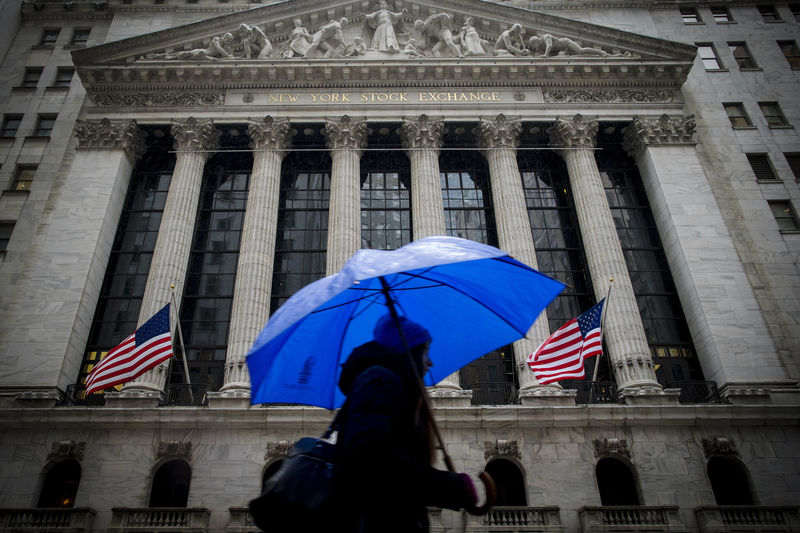S& P 500 hits all time highs U.S.-Japan trade deal optimism
(For a live blog on the U.S. stock market, click LIVE/ or type LIVE/ in an Eikon news window.)
* Industrials slide as new US-China tariffs take effect
* Questions if Rosenstein has quit or not adds to jitters
* Communications services index flat in debut, Comcast weighs
* Energy stocks gain with oil prices; tech recoups losses
* Indexes down: Dow 0.72 pct, S&P 0.51 pct, Nasdaq 0.25 pct (Adds comments, updates to early afternoon)
By Shreyashi Sanyal
Sept 24 (Reuters) - Industrials took the biggest knock on Wall Street on Monday as the latest U.S.-China tariffs kicked in, while adding to uncertainty were questions over whether Deputy Attorney General Rod Rosenstein, who oversees the Mueller investigation, had quit.
With U.S. tariffs on some $200 billion worth of Chinese goods taking effect, along with Beijing's retaliatory duties, eight of the 11 major S&P sectors were lower. The gainers included the rebranded and expanded "communications services" index. industrial sector .SPLRCI , which has borne the brunt of the protracted trade war, fell 1.44 percent, while material stocks .SPLRCM slid 1.48 percent. Boeing (NYSE:BA) BA.N , the biggest U.S. exporter to China, shed 1.3 percent.
The S&P 500 fell to session low after news website Axios reported Rosenstein, who oversees the special counsel investigation into Russia's role in the 2016 presidential election, had resigned. source told Reuters that Rosenstein had not resigned, while a White House spokeswoman said he would be meeting President Donald Trump on Thursday. a near-term cautious environment with Rosenstein contributing to the anxiety around trade," said Randy Frederick, vice president of trading and derivatives for Charles Schwab (NYSE:SCHW) in Austin, Texas.
"The S&P was at a technically overbought position on Friday so it is not surprising to see it pulling back, investors are taking some risk of the table given that trade concerns have now resurfaced."
At 13:02 a.m. ET the Dow Jones Industrial Average .DJI was down 192.69 points, or 0.72 percent, at 26,550.81, the S&P 500 .SPX was down 15.03 points, or 0.51 percent, at 2,914.64 and the Nasdaq Composite .IXIC was down 20.22 points, or 0.25 percent, at 7,966.74.
The CBOE Global Markets volatility index .VIX , known as Wall Street's "fear gauge", rose 1.12 points, its most in a week, as the shuffling of S&P 500 sectors took effect.
Helping curb losses were energy stocks .SPNY , which rose 1.37 percent, as oil prices jumped after OPEC rebuffed calls by Trump to raise supply.
The technology sector .SPLRCT cut earlier losses and was flat, lifted by Apple AAPL.O , whose products have been spared from new tariffs. Apple climbed 1 percent.
The communications services index .SPLRCL , which now houses media stocks besides telecom companies, opened lower in its debut. But it eked out a 0.05 percent gain by afternoon as new member Netflix (NASDAQ:NFLX) NFXL.O climbed 3 percent. new members Twenty-First Century Fox FOXA.O and Walt Disney (NYSE:DIS) DIS.N rose 1.3 percent and 1.5 percent, respectively, after losing an auction for Sky Plc SKYB.L to Comcast CMCSA.O , which slid 7 percent. Kors's KORS.N tumbled 8.50 percent. The fashion group has agreed to take control of Italy's Versace in a deal that could value the company at $2 billion, a source said. issues outnumbered advancers for a 2.23-to-1 ratio on the NYSE and a 1.87-to-1 ratio on the Nasdaq.
The S&P index recorded 15 new 52-week highs and three new lows, while the Nasdaq recorded 37 new highs and 38 new lows.
BA: A Bull or Bear Market Play?
Don't miss out on the next big opportunity! Stay ahead of the curve with ProPicks AI – 6 model portfolios fueled by AI stock picks with a stellar performance this year... In 2024 alone, ProPicks AI identified 2 stocks that surged over 150%, 4 additional stocks that leaped over 30%, and 3 more that climbed over 25%. That's an impressive track record. With portfolios tailored for Dow stocks, S&P stocks, Tech Stocks, and Mid Cap stocks, you can explore various wealth-building strategies. So if BA is on your watchlist, it could be very wise to know whether or not it made the ProPicks AI lists.
Unlock ProPicks AI now